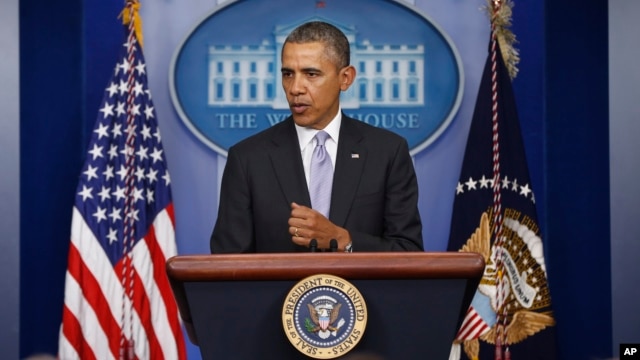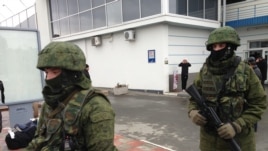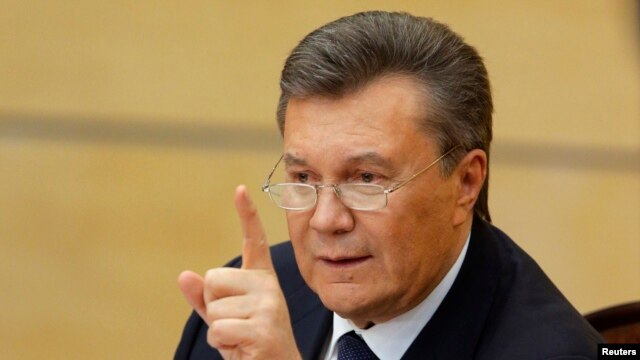Obama Warns of Costs for any Russian Military Intervention in Ukraine
Obama Warns of Costs for any Russian Military Intervention in Ukraine
President Barack Obama speaks about Ukraine in the James Brady Press Briefing Room at the White House in Washington, Feb. 28, 2014
President Obama warned Friday will be costs to any Russian military intervention in Ukraine.
In a brief statement to reporters at the White House, the president said any violation of Ukrainian sovereignty by Russia would be deeply destabilizing.
He said the United States is deeply concerned by reports of Russian military movements in Crimea. Obama said he wants to make it very clear that the Ukrainian people need to determine their own future. He reminded Russia that it has committed itself not to interfere in Ukrainian sovereignty.
Before the president spoke, Ukraine's U.N. ambassador, Yuriy Sergeyev, told an emergency Security Council meeting that Russian attack helicopters and military transport planes have crossed into Crimea.
He described the main airport as being "captured" by Russian forces. Going into the talks, Sergeyev said he wants moral and political support from the world community. He said what is going on in his country is "awful."
The Kremlin said Friday that Russian President Vladimir Putin discussed the situation in Ukraine in telephone calls with British Prime Minister David Cameron, German Chancellor Angela Merkel, and European Council Chairman Herman Van Rompuy.
The Kremlin said the conversations emphasized the need to prevent a further escalation of violence and quickly normalize the situation in Ukraine.
Earlier Ukraine's acting president Oleksander Turchinov accused Russia of open aggression and he urged Russian President Vladimir Putin to stop 'provocations' in televised comments on Friday.
Turchinov was quoted by Reuters news agency as saying, "Russia has sent forces into Crimea...they are working on scenarios which are fully analogous with Abkhazia, when having initiated a military conflict, they started to annex the territory."
Ukraine's interior minister said Russian forces had taken control of the two main airports in Crimea.
Interior Minister Arsen Avakov described the development as a "military invasion" in a Facebook post Friday. He said armed Russian troops were blocking the Belbek airport in Sevastopol, where Russia has a naval base. Unidentified gunmen were also patrolling the international airport in Simferopol, the Crimean capital.
VOA correspondent Elizabeth Arrott, who flew into Simferopol Airport on Friday, reported seeing gunmen wearing camouflage and carrying automatic weapons at the airport.
"I saw about a dozen people in what looks like unbranded military uniforms - very, very professional, with extremely modern, heavy weaponry that they were carrying," she said. "But they had no insignia, nothing to identify them, other than by their demeanor and their dress and their weaponry," said Arrott. "They are not a menacing presence. The airport is open, flights are coming in and they are not bothering anybody."
The Associated Press quoted Ukraine's State Border Guard as saying a Ukrainian coast guard base was surrounded by about two dozen Russian marines.
Ukraine's border guard service also said Friday that more than 10 Russian military helicopters flew into Ukrainian airspace over Crimea. Ukraine's UNIAN news agency and other media posted what they said was a video of the flyover.
Ukrainian media also reported Friday that armed persons were blockading the premises of Krymaerorukh (CrimeaAeroMovement), a state enterprise responsible for controlling air traffic over Crimea.
On Thursday, gunmen raised the Russian flag over buildings in Crimea Thursday. The Kremlin sent Russian fighter jets to patrol its border with Ukraine after announcing large-scale military exercises in the area.
The Crimean parliament voted to dismiss the regional government and hold a referendum to determine Crimea's status in Ukraine. The referendum is set for May 25, the same day Ukraine is scheduled to hold a presidential election.
Yanukovych speaks
The fast-moving events also included the first public appearance by ousted Ukrainian President Viktor Yanukovych since he fled his country. Yanukovich held a press conference from Rostov-on-Don, Russia, defiantly stating he was the legitimately elected leader and that he was ready to fight for Ukraine.
The ousted leader also denied ordering the shooting of protesters that left dozens dead.
He said he was forced to leave Ukraine, and accused his opponents of trying to take control of the country through terror and fear, describing the interim government in Kyiv as "illegitimate." He blamed the West for backing the protest movement.
U.S. Secretary of State John Kerry and Russian Foreign Minister Sergei Lavrov discussed the crisis Friday via telephone. Kerry told Lavrov it was important not to inflame the already tense situation, while also calling on all parties in Ukraine to avoid any steps that could be misinterpreted.
Lavrov, in turn, emphasized to Kerry the need to curb "extreme radicals'' and take into account the interests of all political forces and all Ukrainian regions when trying to end the crisis.
The United Nations Security Council announced it would hold a closed-door meeting on Ukraine Friday afternoon at the request of the acting government in Kyiv, which warned the situation in Crimea could threaten its terroritorial integrity.
Yanukovych fled Kyiv last week and his exact whereabouts were not known. Ukraine's interim government issued an arrest warrant for him this week, accusing him and other officials of mass murder of protesters.
Scores of protesters were killed when Ukrainian riot police tried to disperse camps set up in Kyiv's Independence Square. The anti-government movement erupted after Yanukovych rejected an EU trade deal in favor of one with Russia last November.
Also Friday, Putin finally broke his week-long silence on the crisis, releasing a statement ordering his government to work with Ukrainian and foreign partners to find a financial package to protect Ukraine's collapsing finances.
Corruption
Ukraine's interim Prime Minister Arseniy Yatsenyuk has accused the Yanukovych government of stealing billions from the state treasury. He said $70 billion in Ukrainian government money had been sent to offshore accounts over the last three years, and that $37 billion of credit it received has disappeared, leaving Ukraine with severe financial problems.
Ukraine’s parliament voted this week to attempt to prosecute Yanukovych at the International Criminal Court in The Hague. But Moscow is unlikely to hand over its long-time ally to face international justice, said Phil Clark, an expert on the ICC at London’s School of Oriental and African Studies.
“Giving up Yanukovych would send a very negative signal to the Russian population within Ukraine. At the moment I think all things lead to the fact that Russia will probably keep a hold of Yanukovych. If we do see an ICC case opened, then the prosecutor has another very difficult political negotiation ahead, which is to try and convince Moscow to give Yanukovych up," Clark said.
Swiss authorities launched a money laundering probe into Yanukovych and his son, Oleksander, on Friday, a day after saying they would order banks to freeze any funds connected to the ousted Ukrainian president. Austria also said it would freeze any assets Yanukovych might have in those countries.
The International Monetary Fund and European Union are sending teams to Ukraine to assess the country's needs. The United States also is considering $1 billion in loan guarantees.
Some information for this report was provided by VOA's Elizabeth Arrott in Ukraine and Reuters.
In a brief statement to reporters at the White House, the president said any violation of Ukrainian sovereignty by Russia would be deeply destabilizing.
He said the United States is deeply concerned by reports of Russian military movements in Crimea. Obama said he wants to make it very clear that the Ukrainian people need to determine their own future. He reminded Russia that it has committed itself not to interfere in Ukrainian sovereignty.
Before the president spoke, Ukraine's U.N. ambassador, Yuriy Sergeyev, told an emergency Security Council meeting that Russian attack helicopters and military transport planes have crossed into Crimea.
He described the main airport as being "captured" by Russian forces. Going into the talks, Sergeyev said he wants moral and political support from the world community. He said what is going on in his country is "awful."
The Kremlin said Friday that Russian President Vladimir Putin discussed the situation in Ukraine in telephone calls with British Prime Minister David Cameron, German Chancellor Angela Merkel, and European Council Chairman Herman Van Rompuy.
The Kremlin said the conversations emphasized the need to prevent a further escalation of violence and quickly normalize the situation in Ukraine.
Earlier Ukraine's acting president Oleksander Turchinov accused Russia of open aggression and he urged Russian President Vladimir Putin to stop 'provocations' in televised comments on Friday.
Turchinov was quoted by Reuters news agency as saying, "Russia has sent forces into Crimea...they are working on scenarios which are fully analogous with Abkhazia, when having initiated a military conflict, they started to annex the territory."
Ukraine's interior minister said Russian forces had taken control of the two main airports in Crimea.
Interior Minister Arsen Avakov described the development as a "military invasion" in a Facebook post Friday. He said armed Russian troops were blocking the Belbek airport in Sevastopol, where Russia has a naval base. Unidentified gunmen were also patrolling the international airport in Simferopol, the Crimean capital.
VOA's Elizabeth Arrott reports from Crimea airport
VOA correspondent Elizabeth Arrott, who flew into Simferopol Airport on Friday, reported seeing gunmen wearing camouflage and carrying automatic weapons at the airport.
"I saw about a dozen people in what looks like unbranded military uniforms - very, very professional, with extremely modern, heavy weaponry that they were carrying," she said. "But they had no insignia, nothing to identify them, other than by their demeanor and their dress and their weaponry," said Arrott. "They are not a menacing presence. The airport is open, flights are coming in and they are not bothering anybody."
The Associated Press quoted Ukraine's State Border Guard as saying a Ukrainian coast guard base was surrounded by about two dozen Russian marines.
Ukraine's border guard service also said Friday that more than 10 Russian military helicopters flew into Ukrainian airspace over Crimea. Ukraine's UNIAN news agency and other media posted what they said was a video of the flyover.
Ukrainian media also reported Friday that armed persons were blockading the premises of Krymaerorukh (CrimeaAeroMovement), a state enterprise responsible for controlling air traffic over Crimea.
On Thursday, gunmen raised the Russian flag over buildings in Crimea Thursday. The Kremlin sent Russian fighter jets to patrol its border with Ukraine after announcing large-scale military exercises in the area.
The Crimean parliament voted to dismiss the regional government and hold a referendum to determine Crimea's status in Ukraine. The referendum is set for May 25, the same day Ukraine is scheduled to hold a presidential election.
Yanukovych speaks
The fast-moving events also included the first public appearance by ousted Ukrainian President Viktor Yanukovych since he fled his country. Yanukovich held a press conference from Rostov-on-Don, Russia, defiantly stating he was the legitimately elected leader and that he was ready to fight for Ukraine.
The ousted leader also denied ordering the shooting of protesters that left dozens dead.
He said he was forced to leave Ukraine, and accused his opponents of trying to take control of the country through terror and fear, describing the interim government in Kyiv as "illegitimate." He blamed the West for backing the protest movement.
U.S. Secretary of State John Kerry and Russian Foreign Minister Sergei Lavrov discussed the crisis Friday via telephone. Kerry told Lavrov it was important not to inflame the already tense situation, while also calling on all parties in Ukraine to avoid any steps that could be misinterpreted.
Lavrov, in turn, emphasized to Kerry the need to curb "extreme radicals'' and take into account the interests of all political forces and all Ukrainian regions when trying to end the crisis.
The United Nations Security Council announced it would hold a closed-door meeting on Ukraine Friday afternoon at the request of the acting government in Kyiv, which warned the situation in Crimea could threaten its terroritorial integrity.
The ousted Ukrainian leader holds a press conference in the Russia city of Rostov-on-Don on Feb. 28, 2014.
Yanukovych fled Kyiv last week and his exact whereabouts were not known. Ukraine's interim government issued an arrest warrant for him this week, accusing him and other officials of mass murder of protesters.
Scores of protesters were killed when Ukrainian riot police tried to disperse camps set up in Kyiv's Independence Square. The anti-government movement erupted after Yanukovych rejected an EU trade deal in favor of one with Russia last November.
Also Friday, Putin finally broke his week-long silence on the crisis, releasing a statement ordering his government to work with Ukrainian and foreign partners to find a financial package to protect Ukraine's collapsing finances.
Corruption
Ukraine's interim Prime Minister Arseniy Yatsenyuk has accused the Yanukovych government of stealing billions from the state treasury. He said $70 billion in Ukrainian government money had been sent to offshore accounts over the last three years, and that $37 billion of credit it received has disappeared, leaving Ukraine with severe financial problems.
Ukraine’s parliament voted this week to attempt to prosecute Yanukovych at the International Criminal Court in The Hague. But Moscow is unlikely to hand over its long-time ally to face international justice, said Phil Clark, an expert on the ICC at London’s School of Oriental and African Studies.
“Giving up Yanukovych would send a very negative signal to the Russian population within Ukraine. At the moment I think all things lead to the fact that Russia will probably keep a hold of Yanukovych. If we do see an ICC case opened, then the prosecutor has another very difficult political negotiation ahead, which is to try and convince Moscow to give Yanukovych up," Clark said.
Swiss authorities launched a money laundering probe into Yanukovych and his son, Oleksander, on Friday, a day after saying they would order banks to freeze any funds connected to the ousted Ukrainian president. Austria also said it would freeze any assets Yanukovych might have in those countries.
The International Monetary Fund and European Union are sending teams to Ukraine to assess the country's needs. The United States also is considering $1 billion in loan guarantees.
Some information for this report was provided by VOA's Elizabeth Arrott in Ukraine and Reuters.




Comments